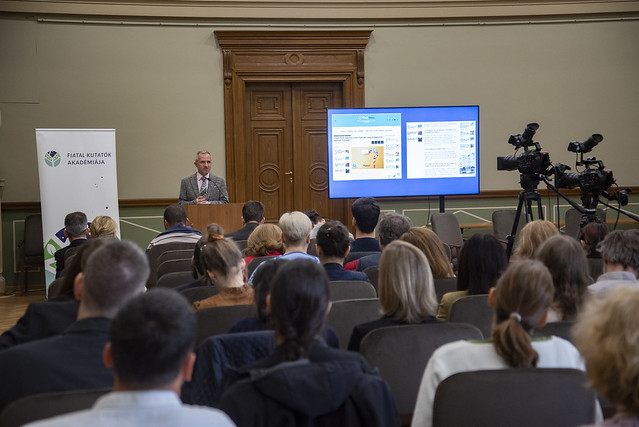
News
The speakers covered a wide range of science communication topics, focusing primarily on sharing good practices and exploiting the potential of modern technology as well as on how to avoid its harmful effects. In his welcome address, Ferenc Hudecz, Vice President of the MTA, stressed the importance of the topic, and the active and constructive role of the Hungarian Young Academy (HYA).
In the first lecture, Dezső Csupor, Professor at the Department of Pharmacy, University of Szeged, and FKA alumnus, attempted to outline the limits of the social responsibility of researchers. In the second lecture, Ágnes Kis-Tóth, Master Lecturer at the ELTE Institute of Physics and Astronomy, highlighted the difficulty of separating scientific knowledge dissemination from parallel discourse on other topics. Janka Sára Molnár, physicist and science communicator, placed great emphasis of giving an early start to the youngest ones by sensitising them to science. As a key take-away message of her talk, she also encouraged researchers to share content that presents their findings in short, light and quickly digestible ways. Zsolt Kelemen, HYA member and associate professor at the BME Department of Inorganic and Analytical Chemistry, concluded the line of scientific presentations, who placed secondary school students in the centre. In order to ensure successful science communication, he considered it essential to take into account the varying information bases and emotions of the different generations, and to turn to the representatives of the age group concerned for authentic tips and advice.
After the presentations, Dezső Csupor, Zsolt Kelemen, Ágnes Kis-Tóth and Janka Sára Molnár continued the debate with a panel discussion moderated by Dávid Havasi, HYA Board member.
During the panel discussion, the participants shared their views on the framework of researchers’ social responsibility, partly reflecting on the audience’s questions. They agreed that one of the keys to successful science communication is credibility, which, however, is difficult to measure by objective standards. The discipline, style and other circumstances of science communicators sharing content will all affect their perception as credible and authentic or not. The key is to keep our integrity, stay true to ourselves, and only take on content and in a way that we feel fits our comfort zone. This is why participants did not venture to elaborate on science communication towards the elderly, for instance: they did not feel they could be authentic sources of information for this generation.
It was also formulated that it is often difficult for researchers to decide when to speak out and when to remain silent. A challenged accepted at the wrong moment, in the wrong context, can legitimize views that are not based on any scientific basis. At the same time, in some cases, overlooking such views may carry objective risks, even life-threatening ones. This was the case, for example, when medicinal effects were attributed to the consumption of a poisonous plant and some people tried to convince others of that.
The conclusion of the roundtable discussion was that it is very difficult to communicate science effectively in an accelerated communication space, especially through online platforms , but that these efforts must continue. This is in the interest not only of the research community and science, but also of society at large.
For a photo gallery of the lectures presented at the Young Researchers’ Forum, click here.
(Cover photo and photo gallery: mta.hu / Tamás Szigeti)
Watch the Forum on video (in Hungarian):
You may also access the video of the General Assembly of the Hungarian Young Academy (in Hungarian):